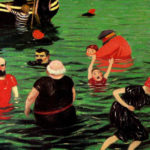We run our website the way we wished the whole internet worked: we provide high quality original content with no ads. We are funded solely by your direct support. Please consider supporting this project.

Your Prayers Matter
My conviction is that many Christians do not pray as passionately as they could because they don’t see how it could make any significant difference. They pray, but they often do so out of sheer obligation and without the sense of urgency that Scripture consistently attaches to prayer.
The problem, I believe, is that many Christians have an understanding of divine sovereignty in which the urgency of prayer simply doesn’t make much sense. They believe that God’s plans cannot truly be changed; the future is exhaustively settled. They interpret the cliché “God is in control” to mean that “God controls everything.” So the obvious question is, what real difference could prayer possibly make?
The common saying that “prayer changes us, not God” simply doesn’t reflect the purpose or the urgency that Scripture gives to petitionary prayer.
Because the future is not entirely settled and God’s plans can change, the open view of the future is able to render the purpose and urgency of prayer intelligible in a way that neither classical Arminianism nor classical Calvinism can. The open view is able to declare, without qualification or inconsistency, that some of the future genuinely depends upon prayer. On a practical level, this translates into people who are more inclined to pray with passion and urgency.
God’s goal of creation is the participation of humans in the loving triune relationship that God is throughout eternity. This required a creation that consisted of personal, morally responsible, free agents. He thus ordained that we have “say-so” in how things transpire. He doesn’t want to relate to robots; he wants to interact with real persons. There can be no authentic personhood without some element of say-so, some degree of self-determination, some authentic power to influence things.
Because God wants us to be empowered, because he desires for us to communicate with him, and because he wants us to learn dependency on him, he graciously grants us the ability to significantly affect him. He enlists our input, not because he needs it, but because he desires to have an authentic, dynamic relationship with us as real empowered persons.
The open view teaches that God sovereignly ordained that prayer be one of our central means of influencing what transpires in history. It is our means of influencing God’s decisions about the future. The Lord does not play with words when he teaches and illustrates throughout Scripture that much of what will happen in the future depends upon prayer: “If my people … humble themselves [and] pray … then will I hear from heaven … and heal their land” (2 Chron 7:14).
Think of it this way: Before creation, God possessed 100 percent of all power and thereby all the say-so. When the Triune God decided to express love by bringing forth a creation, each creature was invested with a part of that say-so. The say-so of the triune God was at the point of creation no longer the only one who determined how things would go.
Human say-so is designed to be spent on both the physical and spiritual realm. We can choose to either work with or against God in terms of how we live and affect other people physically. We can also choose to work either for or against God spiritually by “cashing in” on our say-so through prayer.
We are morally responsible for how we use or don’t use both. Aspects of the future truly depend on us.
—adapted from God of the Possible, pages 95-98
Photo credit: sheilaz413 via Visual Hunt / CC BY-NC-ND
Category: General
Tags: Free Will, Open Theism, Prayer
Related Reading

Where is Human Free Will in the Bible?
The Bible is emphatic on its teaching that humans possess free will and are capable of originating evil. Notice, for example, that in the very first chapter of the Bible God commands humans to be fruitful and exercise dominion over the animal kingdom and the earth (Gen. 1:26). The fact that God must command us…

How People Misunderstand Open Theism
Open theism holds that, because agents are free, the future includes possibilities (what agents may and may not choose to do). Since God’s knowledge is perfect, open theists hold that God knows the future partly as a realm of possibilities. This view contrasts with classical theism that has usually held that God knows the future exclusively as a domain…

Podcast: If Our Names Have Been in the Book of Life Since Before Creation, Are We Still Free?
Greg considers the documentation habits of the Lord. http://traffic.libsyn.com/askgregboyd/Episode_0382.mp3

Lord Willing? Part 3
In this final segment of Greg’s discussion with Jessica Kelley about her book Lord Willing?, Jessica talks about how to respond to someone who is grieving or in crisis. You can find part 1 here and part 2 here. We’re so grateful that Jessica took the time to share her story with us. We know…

When Did You Let Go of Your Calvinist Beliefs? (Podcast)
Greg talks about his unusual transformation out of Calvinism. Episode 471 The Interview: http://traffic.libsyn.com/askgregboyd/Episode_0471.mp3 Photo by Paola Franco on Unsplash.com

What Does a Perfect God Look Like?
The “classical view of God” refers to the view of God that has dominated Christian theology since the earliest Church fathers. According to this theology, God is completely “immutable.” This means that God’s being and experience never changes in any respect. God is therefore pure actuality (actus purus), having no potentiality whatsoever, for potentiality is…
